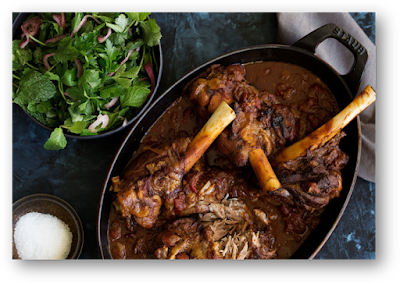Cooking Method: Braising and Stewing
What is Braising and Stewing?
- Braising is slow cooking a large cut of meat or other ingredients in enough liquid
- Stewing is slow cooking a small cut up or smaller pieces of meat or other ingredients in a liquid.
 |
| Braising Method: Braised Lamb Shank |
Read: 5 Basic Recipes of French Mother Sauces and Their Derivatives
Braising and Stewing Ingredients
- Characteristic: Less tender cut, mature animals, less expensive cuts
- Suitable Item: Meat (beef, lamb, pork, veal), poultry (chicken, duck, turkey), game (feathered and furred), and vegetables.
- Liquids: Well-flavored stock, Appropriate jus or Wine
- Aromatics: Sachet d'epices, mirepoix, bouquet garni, herb and spices
- Optional components: Thickening agent ( roux, slurry, etc.) and garnish.
 |
| Stewing Method: Stewed Beef |
The Main Differences Between Stewing and Braising Method
- The difference between stewing and braising are the size of the meat, the amount of liquid, and the method of cooking
- Braising is usually using a large piece of meat, such as shoulder, rump roast, lamb shanks, or beef short ribs. The liquid of braising between ⅓ to ½ to covers the item
- Dishes like Braised beef, Osso Bucco, or Braised lamb shank
- Stewing is using cut up or smaller pieces of meat like a cube or dice of meat, seafood, and cut of chicken. The liquid of stewing, just to covers the item
- Dishes like Stewed beef, Lamb curry, Beef goulash, Beef rendang, or Beef bourguignon.
 |
| Braising Vs Stewing |
Braising and Stewing Method - Step by Step
- Season or marinate the main item
- Sear all main item on all of the sides in a hot pan
- Remove the main item; set aside
- Add mirepoix and caramelized
- Add Tomato paste, saute until the dark color
- Add or deglaze with liquid
- Bring the mixture to simmer
- Return the main item to the liquid mixture
- Cover and finish cooking until fork-tender
- Add aromatic/garnish when appropriate
- Remove the main item
- To prepare the sauce: strain, reduce, thicken with a thickening agent
- Slice or carve the main item
Note.
- For stewing: Follow method through step 9, correct flavor and consistency as needed
Share our Links
SitemapPrevious: Poaching,
Next: Sous-vide,
Culinary Training Program,
AMAZON Chef's Collection,
PDF Presentation,
No comments:
Post a Comment